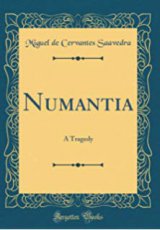The Siege of Numantia Page #21
The Siege of Numantia is a tragedy by Miguel de Cervantes set at the siege of Numantia. The play is divided into four acts. The dialogue is sometimes in tercets and sometimes in redondillas, but for the most part in octaves.
Numantia's powerful arm, and constant soul! In her alone I find such worth extreme As claims a record in the proudest lays; Such wealth of matter for the poet's theme, I That thousand ages may rehearse always Her deathless courage, and her strength supreme, Which claim in prose and verse the loftiest praise; 'Tis mine, in trust, to garner so much glory, And so give happy ending to our story! END OF THE TRAGEDY. NOTES. NOTE 1, PAGE 1. Scipio. This general was the famous Publius Scipio Aemilianus Africanus Minor. His first campaign in Spain was in the year B.C. 151, when he acted as "legatus" to the Consul Lucius Licinius Lucullus, who was then engaged in the conquest of the Celtiberians. He greatly distinguished himself at the siege of Intercacia, where he was the first to scale the battlements, and received for his exploit a mural crown. He also displayed his personal courage in fighting single-handed and slaying a mighty Spanish giant, who used to insult and defy the whole Roman camp. He was then about thirty-four years of age. In the year B.C. 147 he was elected Consul and sent to Africa, where he fulfilled the stern mandate of the Senate: "Delenda est Carthago!" and became the most renowned warrior of his age. In the year B.C. 134, when affairs in Spain were at the lowest ebb, and the Numantines had thoroughly cowed the Romans, Scipio was again made Consul, and sent to do what no one else was thought competent to do--to bring the siege of Numantia to a final end. The result is well-known, and details may be found in the pages of Floras, Appian, Plutarch, and Livy. A very graphic summary of these is given in the third book of Mariana's Historia de España. The vivid picture presented in this tragedy of Cervantes may suffice, however, for the present generation. Though Scipio is therein represented simply as the chief minister of Fate, yet his personality stands boldly out; and his character as accomplished scholar, stern disciplinarian, and cautious tactician, is very skilfully pourtrayed. His stirring address to the soldiers is a perfect epitome of his whole military creed. The fall of Numantia was the sensation of the day throughout the empire, and the last great military feat of Scipio. It settled the fate of Spain for many a long year. Scipio entered Rome in triumph, and the Senate added to his other titles that of "Numantinus." NOTE 2, PAGE 1. Jugurtha. This notorious Numidian prince, the illegitimate son of Manastabal, grandson of Masanissa, and the nephew of Mecipsa, king of Numidia, was sent by his uncle to give succour to Scipio during the siege of Numantia. He arrived there with a train of ten elephants, and a goodly array of horse and foot. His uncle's secret design, however, was to get rid of him, as a dangerous rival to his own sons, Adherbal and Hiempsal, in the succession to the crown. This, however, was not to be. Jugurtha not only survived the campaign, but so distinguished himself, that he became a prime favourite of Scipio, and returned to his native country with added lustre to his name, and stores of military experience. His after-career, adventurous, reckless, and unfortunate, which led him at last to the Mamertine prisons in Rome, does not concern us. It is to be found, as every schoolboy knows, in the brilliant pages of Sallustius, De bello Jugurthino. NOTE 3, PAGE 2. Caius Marius. This man, whom Cervantes represents as a bluff, quick-witted, daring soldier, was the celebrated Caius Marius, a plebeian by birth, and the cruel scourge of the patricians in after times. He was only twenty-three years of age at the date of the siege, and was still in the ranks. His peculiar military qualities gained him the good-will of Scipio, who used often to invite him to his table. On one occasion, when the question was asked where a similar general to Scipio could be found when he was gone, Scipio placed his hand on the shoulder of Marius and said smilingly, "There, perhaps!" The glory and experience he gained under Scipio's auspices were the foundation of his future fortunes. Strange to say, when twenty years afterwards he rode in triumphal procession through the streets of Rome on account of his victories in Africa, the principal captive who graced his triumph was his old Numantian comrade, Jugurtha, in chains. The prince and the peasant had met again, but under what altered circumstances! NOTE 4, PAGE 6. Full sixteen years and more. According to the Latin historians, the war with Numantia lasted fourteen years, and the close siege under Scipio, a year and three months. The ruins of Numantia are still to be seen at Puente de Garray, near the source of the Duero, about five miles from Soria, an ancient town of Old Castile. The present remains, however, are principally imperial, and prove that the town must afterwards have been rebuilt. Numantia was a stronghold by nature. It was situated on a little hill precipitous on three sides, and on the fourth, looking towards the north, sloping down to a spacious plain, covered with thick forests and fertile fields, watered by the Tera, a tributary of the Duero. From its commanding position in the centre of northern Spain, it served as a bulwark to check the advance of the Roman legions, and also as a city of refuge for the oppressed tribes. According to Cervantes its warriors amounted only to three thousand:-- "Can three thousand stand the shock Of the eighty thousand there?" Some historians estimate the number at eight thousand, and even this seems too small for the grandeur of their achievements. On one occasion (three years before the advent of Scipio) when the Consul, Caius Hostilius Mancinus, raised the siege in despair, and attempted to escape through the defiles of the mountain by night, the Numantines sallied forth in force, slaughtered 20,000 of the Roman troops, and allowed the rest to capitulate, under condition of signing a perpetual peace with Numantia, and retiring to Rome. The Roman Senate repudiated the transaction, and sent back the disgraced Consul to submit to the mercy of the Numantines. Thereafter it was found necessary to concentrate the whole military talent of Rome on the reduction of this proud city. The siege of Numantia, like that of Saguntum, displayed in a marvellous way the tenacity, vigour, and reckless heroism of the aboriginal tribes of Spain. It was, therefore, with a pardonable pride that Cervantes, intent on rousing the patriotic feeling of his countrymen, addressed them as:-- "Los hijos de la fuerte España, Hijos de tales padres herederos." NOTE 5, PAGE 20. Thou gentle Douro. This passage in the original is admired for its exquisite sweetness. We give it as a specimen of the melodious octaves of Cervantes:-- "Duero gentil, que con torcidas vueltas Humedeces gran parte de mi seno, Ansi en tus aguas siempre veas envueltas Arenas de oro qual el Tajo ameno,
Translation
Translate and read this book in other languages:
Select another language:
- - Select -
- 简体中文 (Chinese - Simplified)
- 繁體中文 (Chinese - Traditional)
- Español (Spanish)
- Esperanto (Esperanto)
- 日本語 (Japanese)
- Português (Portuguese)
- Deutsch (German)
- العربية (Arabic)
- Français (French)
- Русский (Russian)
- ಕನ್ನಡ (Kannada)
- 한국어 (Korean)
- עברית (Hebrew)
- Gaeilge (Irish)
- Українська (Ukrainian)
- اردو (Urdu)
- Magyar (Hungarian)
- मानक हिन्दी (Hindi)
- Indonesia (Indonesian)
- Italiano (Italian)
- தமிழ் (Tamil)
- Türkçe (Turkish)
- తెలుగు (Telugu)
- ภาษาไทย (Thai)
- Tiếng Việt (Vietnamese)
- Čeština (Czech)
- Polski (Polish)
- Bahasa Indonesia (Indonesian)
- Românește (Romanian)
- Nederlands (Dutch)
- Ελληνικά (Greek)
- Latinum (Latin)
- Svenska (Swedish)
- Dansk (Danish)
- Suomi (Finnish)
- فارسی (Persian)
- ייִדיש (Yiddish)
- հայերեն (Armenian)
- Norsk (Norwegian)
- English (English)
Citation
Use the citation below to add this book to your bibliography:
Style:MLAChicagoAPA
"The Siege of Numantia Books." Literature.com. STANDS4 LLC, 2024. Web. 25 Nov. 2024. <https://www.literature.com/book/the_siege_of_numantia_60>.




Discuss this The Siege of Numantia book with the community:
Report Comment
We're doing our best to make sure our content is useful, accurate and safe.
If by any chance you spot an inappropriate comment while navigating through our website please use this form to let us know, and we'll take care of it shortly.
Attachment
You need to be logged in to favorite.
Log In